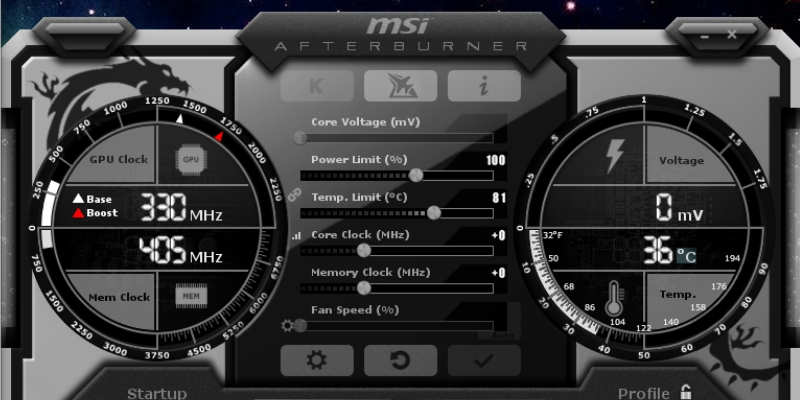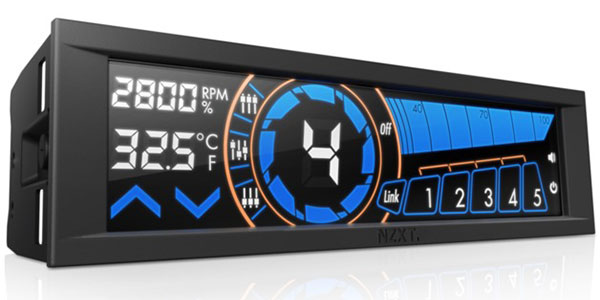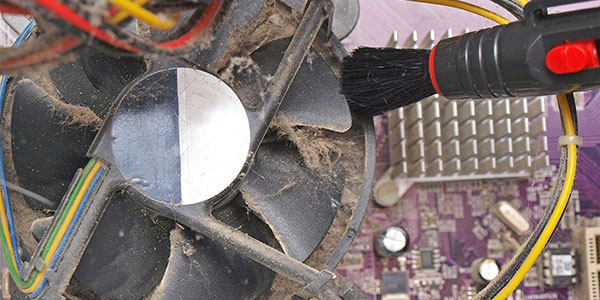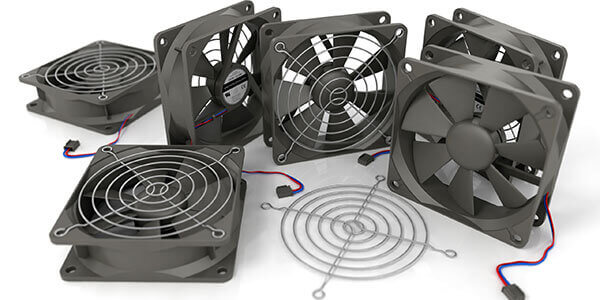Are you annoyed by your computer’s noisy fans? A loud fan can be a problem. Learn why it’s loud, why it’s important, and how to fix it. You can clean the dust from your computer’s fans and remove unnecessary files. You can also download optimization software to keep your computer running smoothly.
Read this article to fix the loud computer fan problem on Windows 11/10 PC.
Why is my Computer Fan so loud?
A computer fan gets loud when it needs to cool down your computer due to reasons like high internal temperatures caused by demanding tasks, dust clogging the vents, or insufficient airflow.
While some fan noise during intense activities is normal, persistent loud fan noise may indicate a problem. Excessive heat from tasks like gaming can make fans work harder. Dust buildup and poor ventilation also strain the cooling system, requiring fans to run faster.
Additionally, high disk and RAM usage generate heat. If your fan rattles loudly for an extended time, there could be a mechanical issue. Diagnosing and addressing these factors can help maintain your computer’s performance and lifespan.
Is it bad if my computer fan is loud?
Loud computer or laptop fans can signal problems if they persist. These fans keep your computer cool, and excessive noise indicates they’re working harder than usual.
If they can’t manage heat well, your computer may slow down, and the CPU may even shut down to prevent damage, leading to crashes and other startup issues.
How Can I Fix my Loud Computer Fan and Make it Quieter?
To quiet a noisy computer fan, follow these simple steps:
- Close background apps and processes.
- Shut down unnecessary browser tabs.
- Run a malware scan to ensure your system is clean.
- Enhance airflow around your computer’s vents.
- Clean out dust from ports and vents.
- Restart your computer after turning it off for a few minutes.
1. Stop Running Resource Intensive Apps
When your computer’s performance is strained due to resource-intensive apps and processes, you can use the Task Manager to identify the culprits. Here’s how:
- Right-click on the Taskbar and choose “Task Manager.”
- In the “Processes” tab, you can see which programs are utilizing CPU and memory resources.
- If a program stands out with significantly higher resource usage or if something is using 100% disk usage, right-click on it and select “End task” to terminate it.
It’s typical for a computer to produce noise during processing, but if the CPU fan is loud, and Task Manager indicates high activity, it’s advisable to close some programs to alleviate the strain on your system.
2. Give More Room To Fresh Air To your PC or laptop
To ensure your PC or laptop gets enough fresh air, place it on a flat, smooth surface like a desk or the floor. Avoid carpeted areas or enclosed spaces like drawers and cabinets, as good airflow is crucial for keeping your device cool. Your computer’s fans need space to expel hot air, so provide a clear path for it.
The same principle applies to laptops. When using one, opt for a desk or table. If you must use it on your lap, limit the time. Consider using a laptop cooling platform with a built-in fan to keep it cool. Cooling pads enable lap use without overheating concerns. Just be mindful not to leave your laptop in direct sunlight for extended periods, as it can quickly heat up.
Also, ensure your laptop or PC has rubber “feet” on the bottom to create a gap between the casing and the surface it rests on. This space is essential for heat dissipation, so replace these feet if they are worn or missing.
3. Close Unnecessary Browser Tabs
To prevent your computer fan from going wild, it’s essential to manage your open browser tabs. Browsers like Chrome and Safari consume more resources as you open additional tabs, leading to increased heat and fan activity.
Read Also: What is Google Chrome Helper Renderer Error? Can I Disable It?
To address this, you can close tabs you no longer need by right-clicking on a specific tab and choosing “Close tabs to the right.” This way, you can reduce the strain on your computer and keep your fan quiet.
Additionally, you can bookmark all your open tabs for easy access later by right-clicking next to the + icon on the browser ribbon or by using the shortcut Ctrl+Shift+D. This allows you to organize your tabs and find them quickly when needed.
4. Manually Adjust PC Fan Speed
When your computer fans are running continuously, you can gain control by using PC fan control software. Manually adjusting fan speed is possible through this software. There are two main ways to go about it.
The first method involves accessing the hardware monitoring section in BIOS settings. However, it’s crucial to have a good understanding of BIOS settings to avoid potential system failures.
The safer and more user-friendly approach is to download PC fan speed controller software onto your desktop or laptop PC. Before doing so, ensure that your motherboard model supports the software and that it is compatible with all PC fans or specific fan types like 4-pin PWM adapters or 3-pin models.

If your fans are connected to the motherboard, it is recommended to use SpeedFan for monitoring the CPU fan and Case fan, while MSI Afterburner is the ideal choice for controlling the GPU fan’s speed. These software tools provide effective control over your computer’s fan performance.
5. Buy A PC Fan Controller Hub
If the previously mentioned software solutions do not resolve the issue of uncontrollable PC fans, the problem may be related to fans directly connected to the power supply.
In such situations, it is advisable to invest in fan controller hubs, a hardware solution. Brands like Noctua and NZXT offer some of the finest PC fan controller hubs suitable for various PC setups.

These hubs come with various features, including knobs, touch displays, temperature sensors, and more, providing you with comprehensive fan control. Once you’ve fine-tuned the fan speed to your liking, your gaming sessions should become more peaceful and enjoyable.
6. Use optimization software
Utilize PC optimization software to reduce fan noise effectively. This software streamlines your computer’s performance, eliminating the need for manual fan control.
One such tool is Avast Cleanup, which operates discreetly in the background, optimizing your system and minimizing fan noise without any noticeable impact on your PC’s operation.
7. Clean Your Computer Fan
If the previous methods fail to resolve the issue of a loud computer fan, the next step is to open your computer or laptop for cleaning.
Dust is the primary adversary of these machines, often leading to overheating problems, which can result in a noisy computer fan.
Refer to our previous post for guidance on preventing computer overheating, and apply those techniques to eliminate dust from your computer.
All you’ll require is a can of compressed air, isopropyl alcohol, and patience, as this process can be time-consuming.

Applying some grease or lubricant to your PC fans can also be beneficial, reducing friction and the loud fan noise.
This will enable your noisy computer fan to operate more efficiently and quietly. Before embarking on the fan-fixing journey, it’s advisable to read relevant guides.
Ensure you clean the CPU fan, graphics card fan, and any other component equipped with a fan to ensure optimal performance.
8. Scan for Malware to Resolve Loud Fan Noise
If your computer’s fan is excessively loud, it could be due to malware, causing your system to overwork. To address this issue, use security software to scan for and remove malware.
Malicious software can make your computer’s fans spin faster and produce a rattling noise. If you suspect that your noisy computer fan is related to malware, employ a virus removal tool to eliminate the infection. Some hackers distribute crypto mining software through malware, which can lead to excessive fan noise as it utilizes your system’s resources.
Certain malware may even attempt to evade detection by pausing their activity when you open Task Manager. Virus removal software is essential to safeguard your computer from such threats and ensure a quieter fan operation.
9. Replace the Faulty PC Fan
If your computer continues to produce excessive noise or unusual rattling and grinding sounds even after attempting the aforementioned solutions, consider replacing your fan.

For those with knowledge of computer assembly, the process of removing the old fan and installing a new one is straightforward. Ensure that the new fan is the correct size to avoid compatibility issues. If uncertain, consult the manufacturer’s website for compatibility specifications or measure the screw holes in the fan mount.
Pay attention to the arrows on the fan, indicating the airflow direction, and use rubber insulators (instead of metal screws) during installation to prevent vibrations from transferring to the case, which can lead to computer fan rattling. With meticulous installation, your computer will operate more quietly than before, with reduced dust accumulation in its air pathways.






